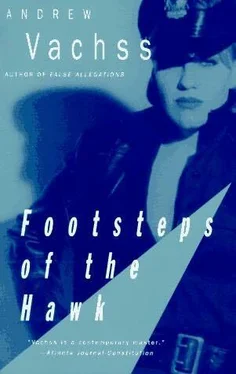"So walk away," he said. "What's the problem?"
"There's another cop," I went on like I hadn't heard him. "He's been on my case forever. We had some dealings— he didn't like the way they turned out. Now he thinks I'm connected to a bunch of murders— I don't know why. He's been around, watching. Turns out he was one of the investigators on one of the rape–murders this guy— the guy the lady cop says is innocent— is doing time for. It's all too coincidental for me to buy it. Fortunato, he's all mobbed up, right? Julio's gone, sure…but the family's still in business. I thought you might…"
"What? Call off the dogs?"
"If that's what it is."
"That's not what it is. Fortunato's a worm. The family may know something about how Julio got done, but not a one of them cares. You know better than that. Why would they care? For honor ?" he sneered.
"I don't know," I told him. "But why would a mob mouthpiece like Fortunato take this kind of case?"
"Don't make a big thing out of it," he said. "It's all about this"— rubbing his thumb against the first two fingers of his right hand, a money gesture. "There's really only two families now. One deals with drugs, the other does the unions, gambling, puts money on the street— all the old stuff. Fortunato, he's nothing— a dealer, not a lawyer. If they didn't fix the juries for him, he's nothing. And he knows it, see? This is all about greed, that's all. But if you want, I could have somebody talk to him…"
"I don't know…"
"Don't get cute, he said. "I'm not going to talk you into it. You want it done, it's done. If not, no. Capisce ?"
"Yeah."
"And…?"
"Do it," I told him, "And thank you."
The next morning, I shaved extra carefully before I put on my lawyer outfit. What I needed was a look at the court file they'd have on Piersall. Not the criminal file— Fortunato would already have all of that for the appeal— what I wanted was over at the Surrogate's Court. A look at that trust fund.
They kept me waiting almost forty–five minutes before I got into the office. Not the judge's chambers, the office they gave his law secretary. "Law secretary" isn't what it sounds like— they're all lawyers themselves, and they don't do any typing or filing. What they do depends on the judge, whatever the judge wants. And they get their jobs the same way the judges do— the right person taps them on the shoulder and they're made. Kind of like the Mafia would be if the feds made them swallow Affirmative Action.
This one was a skinny guy with a prominent Adam's apple, hair cut real short. He was wearing a white button–down shirt and black suspenders, sleeves rolled up like he'd been hard at work for hours.
Sure.
"My name is Rodriguez, sir," I introduced myself. He looked up impatiently, not offering to shake hands. "This concerns a client," I continued. "George Piersall. What we need is some information regarding Mr. Piersall's trust fund…I understand it came about as a result of a bequest. I wonder if it would be possible to look through the file…?"
"You are a lawyer, Mr…ah…Rodriguez?" he asked, just this side of snide. If I'd told him my name was Anderson, he wouldn't have asked.
"No sir," I replied. "I apologize. I should have made that clear. I am a paralegal— I work for Raymond Fortunato."
The weasel's face shifted. Not a lot, but I'd been looking for it. He was a mid–list ass–kisser— he did it on the way up, and he expected those below him in the political food chain to treat him the same way. But he wouldn't risk offending someone of Fortunato's weight.
"Will you excuse me a moment?" he asked. "I need to make a phone call."
"Certainly, sir," I said, backing out of the room. I took a seat on the polished wood bench in the corridor, one hand stroking my status–appropriate attaché case.
In less than five minutes, the weasel poked his head out of his den, motioned for me to come back.
"Here's the file," he said, handing me three thick folders, holding about half a ream of paper each. "There's a lot to go through, I know, so, if you want, you could use this empty room we have down the hall."
"I would appreciate that," I told him.
He led me to the room. It was bare except for a long wooden table and six matching chairs. I sat down at the table, thanked the weasel again, put on a pair of reading glasses and started to work.
"When you're done, just let me know," the weasel said.
"Thank you, sir," I replied.
As soon as he left the room, I put the reading glasses off to one side. I don't need them— the prescription is for someone with a radical astigmatism. I'd leave them behind…accidentally. It's the same thing I do with the matchbooks— if the weasel ever had to prove I was there, he'd whip out the reading glasses triumphantly…and they wouldn't fit.
Most of the papers were the kind of boilerplate legalese you expect from people who get paid by the hour or by the pound. I finally got to the meat: the guy who left all the money was Morton L. Capshaw, last listed address was on Park Avenue. There's a key to finding the cross streets for any avenue address in New York— what you do is take the number, cancel the last digit, divide by two, then add or subtract another number, depending on the avenue. For Park, it's a +34. Park Avenue runs all the way from Gramercy to Harlem. I did the math— Capshaw lived in the Seventies…big–bucks territory.
I kept reading. He died at Sloan Kettering, the cancer hospital. Age seventy–three when he cashed out. The trust fund was huge— more than seven million. The way it was set up, Piersall got the income only, not the principal. There was a long list after that, all next in line. I counted seven names. Once I sorted it out, it was easy to see what Capshaw had done. Piersall got the income from the trust for as long as he lived. When he died, the next name on the list took over. When they all died, the principal went to something called the Adelnaws Foundation. I read through the rest of it, but couldn't find anything more. The Adelnaws Foundation was a 501(c)(3) corporation— not–for–profit. Its stated purpose was "social research"— you know, what the reverend told the cops he was doing in a whorehouse.
The trustee was a white–shoe law firm with a whole hive of WASPs on its letterhead. They were to pay the interest "monthly, quarterly, or annually, at the election of the beneficiary," and the instructions were to invest in "prudent instruments, the goal being preservation of capital." Commodities, options, and precious metals were specifically excluded from permissible investments.
I went back to the beneficiary tree again. Something about it…Yeah— none of them were named Capshaw. So that meant…Sure enough— I found what I was looking for in the last folder— a will contest. Capshaw's ex–wife, a sister, and a cousin all brought suit, challenging the will on grounds of "undue influence" and "lack of testamentary capacity." Meaning, somebody got to the old man when he was dying, or he was out of his head when he made out the will.
But it was no go. Most of those things get settled out of court, but this one went to the wall. The relatives got zilch— they were completely shut out, even on appeal. The trustee law firm did a little better— they billed for $477,504.25, and the Surrogate allowed them every penny, pulling it right out of the principal.
I looked at the list of beneficiaries again— just the names, dates of birth, Social Security numbers— straight ID stuff. All the beneficiaries were approximately the same age— there wasn't ten years difference between the oldest and the youngest. The list was the only thing in the whole file that varied from the kind of air–pumped filler you find in any document lawyers get their hands on. I copied it onto my yellow legal pad, checked it again to be sure I had it right.
Читать дальше












